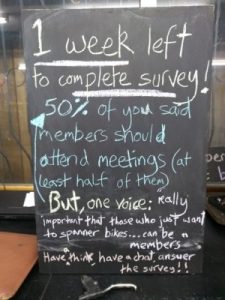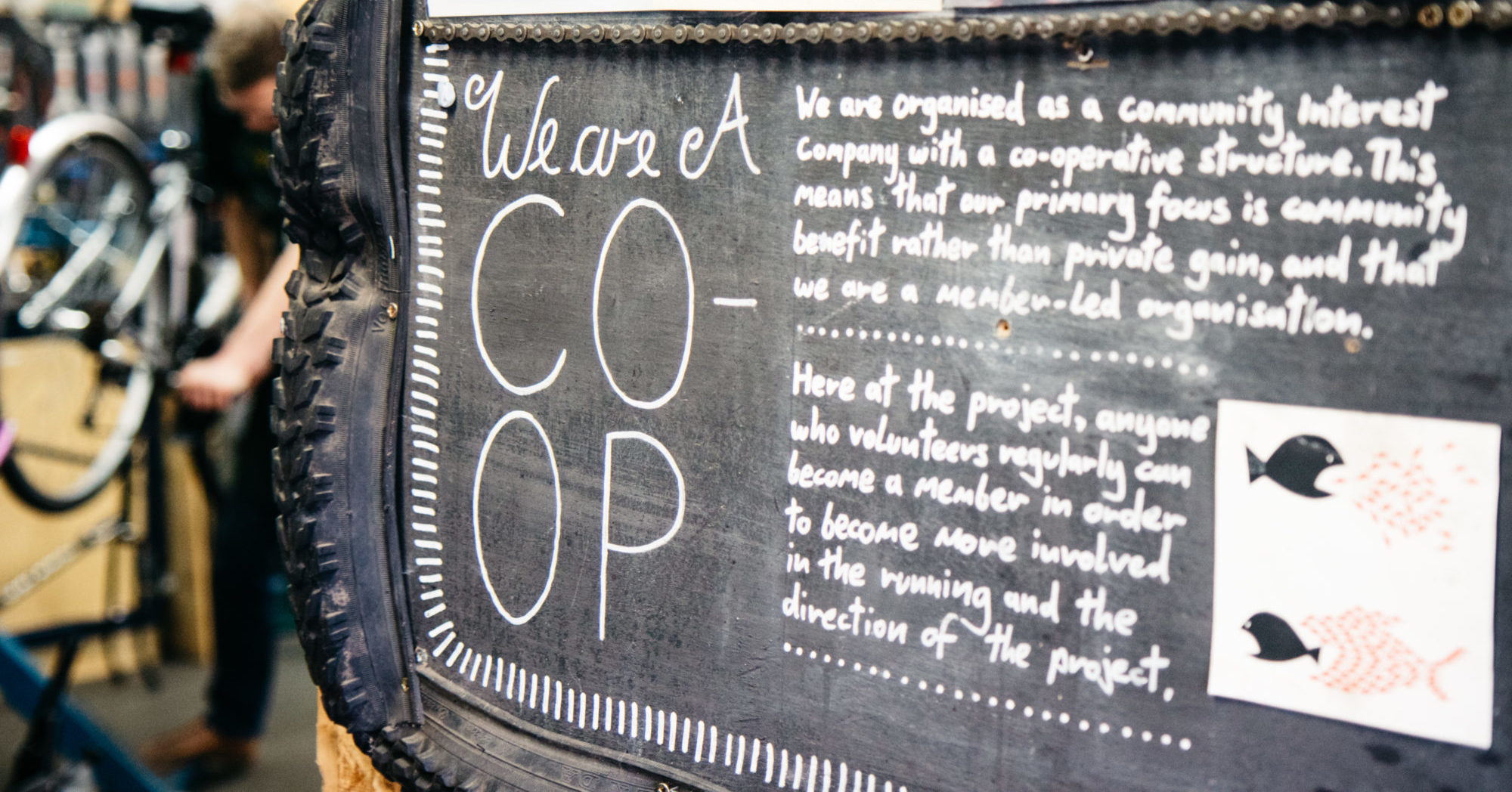Earlier this year, Lucy Colbeck, a post-graduate student in Applied Anthropology and Community Development at Goldsmiths University undertook a 20 day placement with The Bristol Bike Project,supporting us to undergo a review of our membership model. BBP is proud to be a member-led Co-op, putting those on the ground in the workshop at the heart of decision-making, but with the day-to-day of workshop life getting busier by the week, it can often feel a struggle to make the time needed to nurture the nitty-gritty of Co-op governance. We were really excited when Lucy offered her time, and valuable expertise, to facilitate a review of our membership model in a process which was truly by and for the members. In this blog, Lucy talks about how this was made possible, shares the outcomes of the reviews, and offers some reflection on the opportunities and challenges of operating within a Co-op…
“Being part of a co-op is not something most people get to experience, like say, going to school or celebrating the birthday of a good friend. The institutions many of us are familiar with, like schools and workplaces, mostly run on the basis that someone or several people are in charge and decisions are made by them. The lack of conventional hierarchy can make co-ops a potentially bewildering situation for people to enter. So why do people get involved, how do they relate to co-op governance and what does it mean to them?
The answer to this will vary from one co-op to the next. I recently had the chance to investigate this with relatively large member-led (mostly voluntary) and high-profile co-op – The Bristol Bike Project (BBP). BBP takes donations of unwanted bikes, repairs them with the help of volunteers, and rehomes them with marginalised people across Bristol who really need access to affordable transport. They’ve empowered well over 2,000 people to become independently mobile through their Earn-a-Bike programmes since 2008. All participants take part in a one-to-one workshop with one of their mechanics to learn basic bike maintenance and have a free bike to take away at the end of it.
When I first arrived at BBP I was excited to hear they wanted some help with a review of their membership. They had found themselves in a common situation for a successful homegrown co-op – their community work and membership has grown and grown but their internal systems hadn’t quite kept the pace. As such their criteria for membership were very vague and inconsistent with current practice. They had 118 members on their books, at least half of whom were no longer active volunteers in the bike workshop but still eligible for discounts in the shop. Their membership criteria needed clarification, in order to give their members list a spring clean!
In summary, they needed a smaller pool of committed members who understood their role and were willing to get involved in the nitty gritty to keep the co-op running.
Why do people get involved with The Bristol Bike Project?
Although people acknowledged governance as important, attending meetings certainly isn’t top of the list for most people!
In our survey of volunteers and members, we found the top motivations for both groups were related to a sense of community, relationships with others, the practical task of bicycle mechanics, sharing and learning and doing good work in the service of others.
However, the co-op doesn’t have an executive and it cannot run itself without involved and informed members. Many identified the need to demystify governance processes and generate a sense of ownership over the membership process, to help members and prospective members feel confident and motivated.
How to involve a broad and diverse membership in governance processes?
To respond to this challenge, I helped BBP staff design a co-production process[1] to engage the membership and volunteer base in how they would like the membership to operate. I was influenced by Paulo Freire – a famous Brazilian adult educator – who advocated a process of conscientization – the development of critical consciousness in order to act upon and shape one’s own social world. Applying this theory to the Bike Project, I wanted to first create a context for individual reflection on current experiences as a co-op member or volunteer, prompting those involved to question why they come and what they think about the co-op more broadly.

We started with a survey asking a range of questions like “What motivates you to be a member of the co-op?” and “What works well/ could be improved about membership at the co-op?”, as well as more detailed questions like “How many hours should volunteer members be expected to commit per month?” and “What should members get in return from the co-op?”. We also asked people to consider their own level of understanding of how the co-op works- a large majority agreed that they would like more training to participate in governance processes e.g. facilitation, consensus decision making.
We followed the survey with informal and then more formal group discussions between members, facilitated in different ways over the course of the 3 months. This dialogue with others allows for the critical development of understanding, at more or less the same pace, and the identification of issues which can be addressed. Lastly the group was invited to make collective decisions about the membership, using the survey data feedback as an evidence base upon which to rest.
The infographic below summarizes the process we undertook together and the outcomes of it.
Made with Visme Infographic Maker
What did we learn from the process?
- During the engagement process, it’s useful to have an informal ‘pop up’ presence in situ, to prompt discussions and reflection
- We found that some members were encouraged to consider the issues more in person, rather than in a survey format
- Great discussions were held in an informal setting between people of differing views – encouraging co-learning and deeper understanding of perspectives
- Members appreciated the opportunity to consider the system they are in
- “It’s good, nice to get my brain thinking about the coop.”
- Several additional comments came through the survey that members would like to have further opportunities to learn and provide their thoughts on co-op process
[1] Nice definition of co-production here: https://www.scie.org.uk/publications/guides/guide51/what-is-coproduction/defining-coproduction.asp

